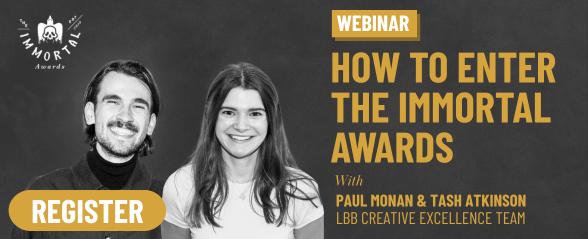
How VIFF is Changing the Face of Film in Canada

Fuelled by passion and a commitment to diverse curatorial excellence, Vancouver International Film Festival (VIFF) fosters a deeper understanding of global cultures through the medium of film. Established in 1982, The festival recognises cinema's unique power to celebrate the richness of the human experience, emphasising the importance of harnessing that power to inspire meaningful change.
VIFF continues to illuminate the future of Canadian filmmaking, weaving together local stories with international narratives to create a rich cinematic tapestry. This year The Greater Vancouver International Film Festival Society - the not-for-profit cultural organisation responsible for the annual Vancouver International Film Festival (VIFF) and its year-round programming - celebrates its 43rd year.
LBB’s April Summers attended the festival’s closing gala, meeting with Curtis Woloschuk, VIFF's director of programming, to discuss the city’s unique identity as a major film hub in Canada, the challenges that face filmmakers in 2024, and how the festival is committed to enhancing community representation within its programming.
LBB> VIFF has a strong focus on showcasing local filmmakers. Can you share some initiatives that VIFF has implemented to support emerging talent in the Vancouver film community?
Curtis> Our industry days this year were all staged in the Mount Pleasant area, at Beaumont Studios. I think that was a really nice way to centre those activities around an area where a lot of production companies, a lot of VFX companies are based – it’s the epicentre of industry here in the city. Those events were open to all of our artists and industry passholders.
In addition to that, we also have some smaller programs like our Catalyst mentorship program that takes on a 15 member cohort of artists each year, all of whom have been identified as having experienced various barriers to entry to the film industry. We host group sessions for them, and we also offer one on one mentorship with established filmmakers, and we’ve seen some really great films come out of that program. Actually, Thea Loo who won the Arbutus Award for Best B.C. Film this year, was a member of that program a few years ago.
On the music side we also have the Amp program which focuses on opportunities for composers who want to learn about writing for TV and film, or those who are curious about the role of music supervisor.

LBB> You’ve been with VIFF since 2013, what changes have you seen in programming in the last 11 years and what is the most inspiring about these changes?
Curtis> The biggest change is to our curatorial voices. Since returning from the pandemic we have worked to make sure that our greater programming team - including our screening committees - are more representative of the Vancouver communities. This has meant looking not only at the team’s expertise on cinema and film history but also their own lived experiences and understanding of how certain films can connect with certain communities, and provide insight for everyone who goes to see them.
LBB> Getting a film made in 2024 is no easy feat. What are some of the key challenges facing filmmakers and producers in Vancouver today, and how is VIFF addressing these challenges?
Curtis> Funding obviously is a huge part of it. The composite funding that needs to happen for a lot of films, either through Arts Councils or Telefilm, Creative BC, is something we try to demystify. By having sessions on pitching or grant writing we teach people how to operate in those spaces. We also introduce them to decision makers in those spaces to make those processes and organisations feel less daunting.
LBB> VIFF serves as a platform for international films. How does this cultural exchange benefit local filmmakers and audiences in Vancouver?
Curtis> For this year’s festival we have cinema from over 70 nations and what this has allowed for is to draw parallels in different spaces. For example, a film like Mati Diop’s Dahomey which looks at the repatriation of artefacts to Africa from France, can be parallelled with a film like So Surreal: Behind The Masks which explores how indigenous masks were taken from nations in this part of the world, inspiring European surrealists and then returned. In both these cases, you see colonial narratives playing out in different spaces and the tremendous infinities between the efforts to repatriate those pieces and the difficult relationships in those spaces as well. I think that is a really important part of international cinema intersecting with national or regional cinema – seeing the contrast and the parallels.
LBB> Vancouver's film scene has evolved significantly over the years, influenced by technological advancements and shifts in audience preferences. How do you perceive the changing face of filmmaking in Vancouver and Western Canada, and what are your hopes for the future of the industry in this region?
Curtis> In the last half decade, going back to shortly before the pandemic, we have seen more and more Vancouver-based filmmakers either premiere their work here then take it to the world stage or premiering at a festival like Berlin then bring it to VIFF after the fact. And this has meant there is much more of an awareness of the work that’s happening here. There’s been a really nice shift in terms of some organisations we work with such as Filmmable or the Collective Bunch who are really about ensuring there is a community that goes along with industry as well. What I’ve seen here is everyone is looking to lift someone up a wrung of that ladder or show them how they navigated this as well – a lot of knowledge sharing and sharing of experience in space is very important in this industry.
LBB> And finally, what has been your favourite moment from the 43rd Vancouver International Film Festival?
Curtis> In the lead up to the festival, the team were discussing how the selections in this year’s program were very deep. Even this final weekend we are showing the Canadian premieres of a few films, and I just feel like everyday has had consistently enriching experiences across the board.
A personal highlight was being able to introduce the Vancouver audience to Universal Language by Matthew Rankin, a filmmaker I have admired for a long time. We’ve shown some of his work before, but this is a film that premiered in Cannes, and will be Canada’s entry to Best International Feature Film at The Oscars. To have Matthew present and involve some of his collaborators in the programming, to speak to the work and thematic aims – being part of that was really special.
Header image credit: Alberto Velasco Ramos















